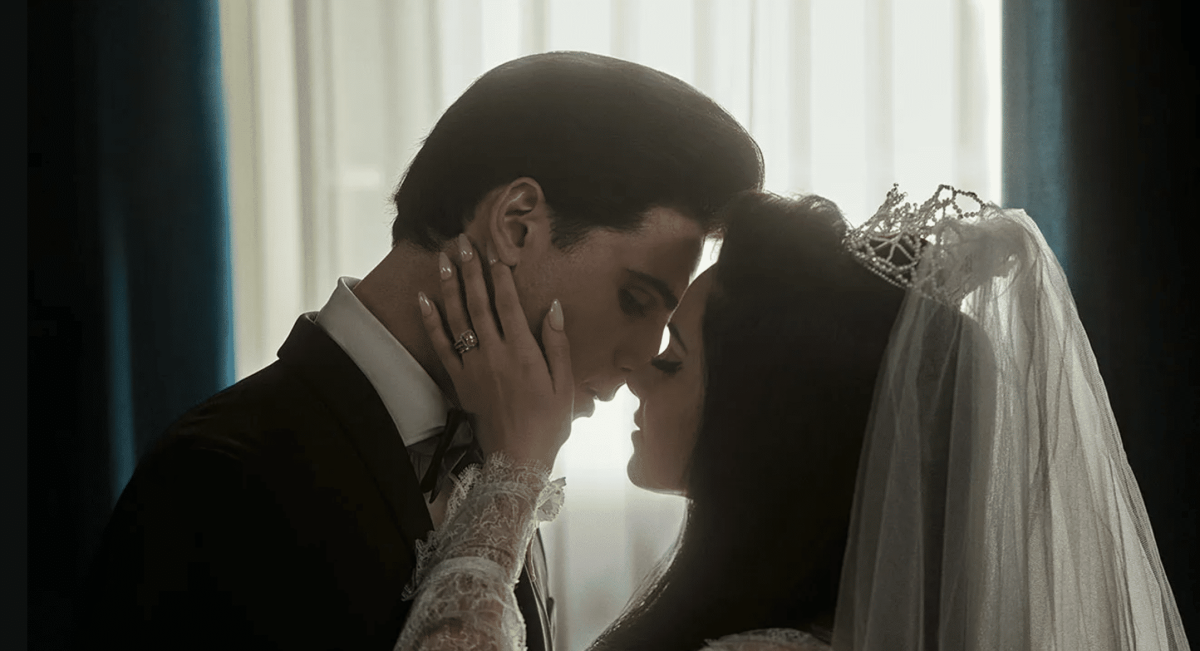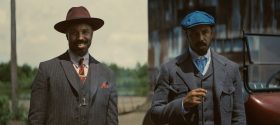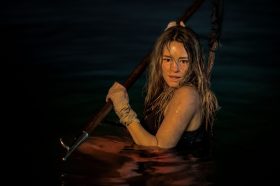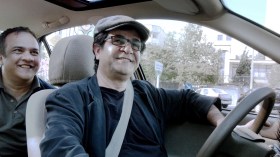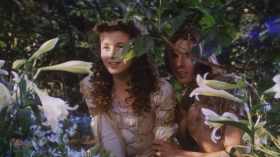The musical notes and guitar-playing Elvis Presley-adorned gates of Graceland were installed at the entrance of his Memphis property in 1957.
Two years later, a 14-year-old Priscilla Beaulieu would meet (and be groomed by) the already world-famous musician, ten years her senior, while he and her father were stationed with the US Army in Wiesbaden, West Germany. By 1963, she had moved into Elvis’ 13.8-acre estate.
In Lost in Translation director Sofia Coppola’s latest languorously drifting engagement with ennui, Priscilla, Graceland’s iron barriers ensnare her subject within a gilded prison.
Adapting the 1985 biography Elvis and Me, penned by Priscilla with Sandra Harmon and originally filmed as a telemovie by Larry Peerce, Coppola casts Mare of Easttown actor Cailee Spaeny in the title role to great effect. Glimpsed during the opening credits, her red-painted toenails sink into pink shag carpet, a whoosh of hairspray accompanying fake lashes and eyeliner applied indulgently, establishing the myth of the woman we all think we know.
But how much are we allowed into Priscilla’s truth?
Suspicious minds
‘“’Do you like Elvis Presley?’ asks Luke Humphrey’s unnerving Terry West, the singer’s creepy soldier pal who approaches Priscilla’s ninth-grader in a diner during the early German-set sequences.
‘Of course, who doesn’t?’ responds a wide-eyed Spaeny.
Australian actor Jacob Elordi, even more impressive than the Baz Luhrmann-cast Austin Butler, embodies a more innately menacing take on Elvis. Priscilla is whisked to a party at his home despite the reservations of her agog parents, depicted all too briefly by Dagmara Dominczyk (Succession‘s non-nonsense Karolina) and Ari Cohen.
Elders are largely excluded here, with Elvis’ cantankerous father Vernon interjecting memorably twice and his grandmother Minnie Mae ‘Dodger’ hovering amiably if mostly silent.
Aided by Stacey Battat’s impeccable costume design plus Cliona Furey and Jo-Ann MacNeil’s hair and makeup magic, Coppola amplifies the eyebrow-raising chasm between the pair. Particularly as he introduces her to popping uppers and downers, leading to Priscilla losing a full two days of their first Graceland retreat together.
Spaeny, unbearably young-looking, conveys the hopeful dreams of a teen swept into a rockstar’s life, as if he stepped fully formed from a poster adorning her bedroom wall. Coppola’s character focus is held even tighter than we’re accustomed by her oeuvre, underlined by the many close-ups of Graceland’s gaudy trinkets and the framing of Priscilla alone and adrift in its palatially spartan interiors.
Elvis has mostly left the building, commandeering the wheel of his tour bus bolstered by a boisterous battalion of hangers-on. As he flits from concert halls to movie sets, Priscilla’s left alone, her suspicious mind avoiding calculus textbooks and instead devouring magazine tittle-tattle about his alleged dalliances with Speedway co-star Nancy Sinatra and Viva Las Vegas’ Ann-Margret, to say nothing of lipstick-kissed letters from Anita Wood.
Gradually transforming into the Priscilla of a million pictures through the cigarette haze of Vegas nights, she embraces her sexual awakening as an oddly infantile Elvis remains steadfastly uninterested. ‘We need to control our desires, otherwise they’ll control us,’ he protests while temporarily hooked on books by new age gurus. She rightly cracks it: ‘I’m a woman with needs who needs to be desired.’
Home fires fading
Of course, they eventually get around to it, signalled by a montage of meals left at their oppressively ornate bedroom’s door. But just as he lets her in, another gate swings shut, with Priscilla’s pregnancy at 22 putting paid to their planned European tour, further encasing her dreams in Graceland.
‘Keep the home fires for me,’ he drawls over the phone, and she responds, ‘The flame’s burning low’.
The dulling embers of their union are evident even in the tragic emptiness of their wedding day, as depicted here, which appears as much a product of posed artifice as a jump-suited Elvis photoshoot that comes later, in a scene painfully broaching the idea that a toddler Lisa Marie found more comfort in the arms of her nanny than her mother.
Many such pained moments are captured in Spaeny’s gaze, but Coppola keeps her dialogue minimal. Priscilla is all too often overwhelmed by capital E Elvis as he increasingly unravels, hurling a chair at Priscilla and smashing one of his platinum-framed records instead of her head.
Her attempts to set boundaries, banning him from stealing the spotlight at her graduation and clapping back, ‘You can’t play without winning,’ after a fierce pillow fight, gain little traction. Some of the film’s most painful moments see her commanded to pack and leave, only for him to wimp out moments later.
Accompanied by a predominantly anachronistic soundtrack assembled by Versailles-based band Phoenix – a meta-textural nod to Marie Antoinette, perhaps – Coppola’s Priscilla holds us deliberately apart from its lead and her interior thoughts.
A promising door opened, offering Priscilla comfort in the company of the young women addressing fan mail in Graceland’s office, is literally slammed shut by a cranky Vernon.
The film’s occasionally ungraceful symbolism also thuds when Elvis bulldozes a rickety old house slowly collapsing on their property. Also falling into the seemingly inescapable biopic trap of covering far too much, a glimpse of her growing emancipation while training alongside karate instructor Mike Stone (Evan Annisette) is cursorily dismissed.
If it feels too thin in the end, then Spaeny is inarguably remarkable. As is Elordi, though Coppola’s far too in awe of her Elvis. If only she could have harnessed more of the ‘goodbye’ energy in the classic Dolly Parton track that closes this worthwhile, if imperfect, character study.
Priscilla is in Australian cinemas from 18 January.
Actors:
Cailee Spaeny, Jacob Elordi
Director:
Sofia Coppola
Format: Movie
Country: USA
Release: 18 January 2024
